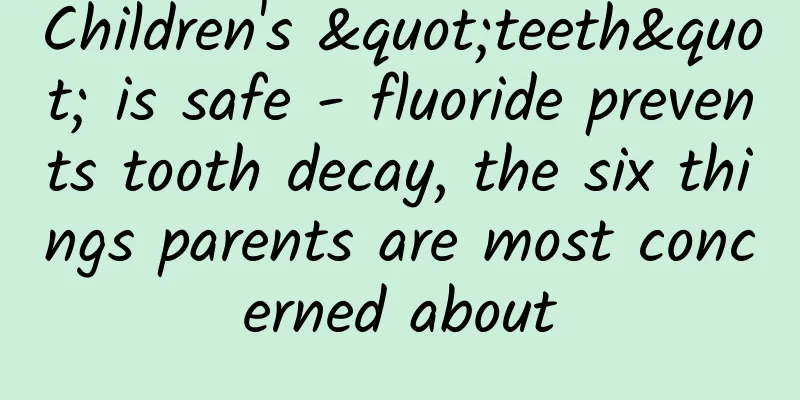Children's "teeth" is safe - fluoride prevents tooth decay, the six things parents are most concerned about

|
Tooth decay, also known as caries, is the most serious oral disease that threatens the oral health of children in my country and is also the most concerning oral problem for children by parents. A person grows two sets of teeth in his or her lifetime: deciduous teeth and permanent teeth. As the first set of teeth that a child grows, if proper protection measures are not taken, deciduous teeth can cause pain and chewing dysfunction, as well as abnormal development of permanent tooth germs, abnormal maxillofacial development, and malnutrition, thus affecting the physical and mental health of children [1]. If you want to protect your teeth, you have to mention the famous "fluoride". You may often hear people mention "fluoride", so what effect does it have on our teeth? Fluoride is a trace element necessary for human health. An appropriate amount of fluoride can prevent and reduce the occurrence of dental caries. Medical research shows that after teeth erupt, it is most effective to prevent dental caries when a constant low fluoride level is maintained in the oral cavity. 1. Why can fluoride prevent tooth decay? ① Fluoride can inhibit and repair tooth decay. Fluoride promotes the attachment of calcium and phosphorus in saliva to the tooth surface, which helps the continued maturation of enamel after tooth eruption. And after small caries occur, fluoride can promote the remineralization of caries and reverse caries to a certain extent. ②Fluoride can make teeth stronger. Fluoride combines with hydroxyapatite in the tooth enamel structure to enhance the tooth's resistance to acid. ③ Fluoride can inhibit and kill bacteria. Fluoride can directly inhibit the growth of bacteria in the oral cavity and inhibit the adhesion of bacteria to the tooth surface. Higher concentrations of fluoride can kill caries-causing bacteria and other bacteria [1]. 2. What are the anti-caries measures of fluoride? Fluoride anti-caries measures include systemic application and local application. Systemic application means "eating" fluoride, which is absorbed by the digestive tract into the blood circulation and then transported to tissues such as teeth and saliva to achieve the purpose of preventing caries. The main measures include: fluoridation of drinking water, fluoridation of table salt, and fluoridation of milk. Topical fluoride is applied directly to the tooth surface to inhibit enamel demineralization and promote remineralization, thereby improving the tooth's resistance to caries. The main measures are divided into two types: home use and medical use: Medical: fluorine-containing coatings, fluorine-containing foams, etc.; Household use: fluoride toothpaste, fluoride mouthwash, etc. 3. At what age can children be given fluoride treatment? There is no age limit for fluoride application. The "Guidelines for the Prevention and Treatment of Caries in Infants and Young Children" recommends that professionals apply fluoride to the child's teeth from the time the first tooth erupts. After that, fluoride should be applied every 3-6 months based on the child's caries risk assessment, and this process should continue until all of the child's deciduous teeth are replaced, generally between the ages of 2 and 14. But please note: ① Before applying fluoride, an evaluation by a dentist is required. ②Children whose assessment results indicate a medium to high risk of caries should undergo a dental examination every 3-6 months. ③Whether children with a low caries risk should receive fluoride treatment in the clinic depends on the professional judgment of the dentist [1,2]. ④Infants and young children under 3 years old have a low level of cooperation, and the use of fluoride foam, fluoride gel and fluoride mouthwash is not recommended. 4. Does it hurt to apply fluoride? Can I eat after applying it? Fluoride application is painless. Fluoride usually has a fruity flavor that children like. The doctor will use a small brush to apply fluoride to the surface of the teeth. The fluoride will harden quickly. Even if the child licks it with his tongue, it usually will not lick it off. The entire fluoride application process can be completed in a few minutes and is completely painless. Do not eat for half an hour before applying fluoride to prevent the child from vomiting when crying; do not eat or drink for half an hour after applying fluoride, remember to eat and drink enough before applying fluoride! 5. Can I apply fluoride by myself at home? It is not recommended to do it yourself at home. Because fluoride application is a trivial matter, if it is not performed by professionals, there are many pitfalls: ①There are potential safety hazards 1>, Dosage requirements are strict and should not be excessive 2>, prone to accidental inhalation or swallowing 3> The crying of the child may cause mucosal damage during the operation ②The effective range of fluoride coating is uncertain ③Unable to conduct a comprehensive oral assessment ④It is not conducive to children's early adaptation to oral diagnosis and treatment 6. At what age can children use fluoride toothpaste? When the child's first deciduous tooth erupts, parents can use fluoride toothpaste to brush their children's teeth twice a day. To avoid improper use of fluoride preparations in children, home fluoride use requires evaluation by a pediatric dentist and should be used under the guidance of a professional doctor. It is recommended that children who can use fluoride toothpaste after evaluation should choose 500-1100 mg/kg fluoride toothpaste. The dosage and precautions for different age groups are as follows: For children aged 0-3 years old, use a rice-sized amount of toothpaste each time and use gauze to remove any remaining toothpaste in the mouth after brushing. For children aged 3-6 years, use a pea-sized amount of toothpaste each time, and it must be used under the supervision of a teacher or parent to reduce accidental swallowing and residue [2,3]. In addition, it should be noted that children under the age of 6 are at a higher risk of swallowing fluoride when using fluoride preparations, so fluoride mouthwashes and critically high-dose fluoride toothpastes should not be recommended for children in this age group to avoid fluorosis and skeletal fluorosis [4]. In short, the use of fluoride is a very effective way to prevent tooth decay, but it cannot replace daily brushing. Effective brushing combined with the use of fluoride can give children a set of strong teeth. Don't ignore small teeth Brush your teeth every morning and evening Master the basic knowledge of using fluorine Help children prevent tooth decay References [1] Zhang Qiong, Wang Jun, Xia Bin, et al. Expert consensus on clinical management of dental caries in young children[J]. West China Journal of Stomatology, 2022, 40(5):9. [2] Chinese Stomatological Association Pediatric Dentistry Committee, Chinese Stomatological Association Oral Preventive Medicine Committee. Guidelines for the prevention and treatment of dental caries in infants and young children[J]. Chinese Journal of Stomatology, 2021, 56(9): 849-856. [3] Ministry of Health. Oral health guideline for Chinese residents[J]. Chinese Journal of Geriatric Stomatology, 2010, 45(1):4-10. [4] Chen Xiaoxue, Zhang Zhenhua, Xu Hui. Health risks of fluoride in preventing and treating dental caries[J]. Chinese Journal of Endemiology, 2023, 42(11):938-941. Wuxi Children's Hospital Author: Yue Yuanyuan Reviewed by: Wang Yan, Xu Xianyin |
Recommend
What causes nosebleeds during confinement?
The mother who is in confinement after childbirth...
How to maintain the uterus after abortion?
The uterus is a very important reproductive organ...
What does the uterus look like?
The uterus is a unique organ of women. It is the ...
How many types of mascara brush heads are there? Who is the sea urchin brush mascara suitable for?
As one of the must-have items in women's cosm...
What causes brown menstrual blood?
If the menstrual blood is dark brown, then you ne...
What should I do if I see blood before giving birth?
Many pregnant women report experiencing spotting ...
No. 1 on the "dirtiest fruits and vegetables list"! Is it still edible to eat this fruit that is on the market in winter?
Winter is the season for sweet strawberries. Have...
Is the test paper dark and light? Is it pregnancy?
Female friends are not unfamiliar with early preg...
What foods should I eat with polycystic ovary syndrome?
The occurrence of polycystic ovary syndrome is a ...
Why should you seek medical attention as soon as possible if you have a headache or vomiting?
Author: Chen Haibo, chief physician of Beijing Ho...
How to clean nipples?
In fact, for women, cleaning of female nipples is...
The lethal ingredient in Kobayashi Pharmaceutical's red yeast rice may be "penicillic acid". What exactly is it?
Recently, Kobayashi Pharmaceutical, a well-known ...
Can I eat glutinous rice balls after a medical abortion?
Medical abortion is a type of artificial abortion...
How long does it take to wake up after anesthesia for painless abortion?
Ladies, when you live together, you must do a goo...
Ovarian cyst pictures
Ovarian cysts are very common. Every ovum or egg ...









